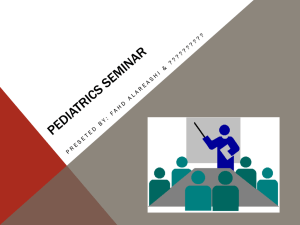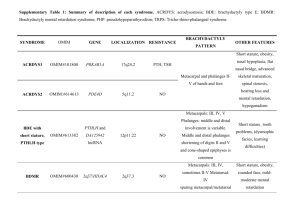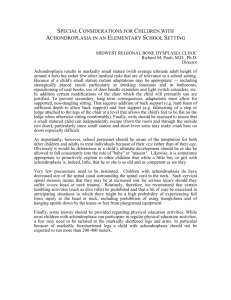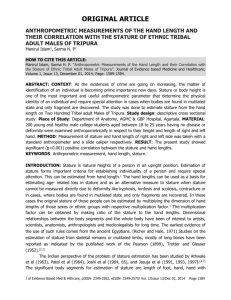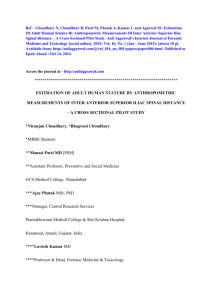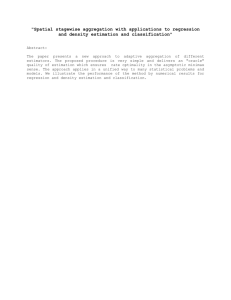ESTIMATION OF STATURE FROM HAND LENGTH AND
advertisement
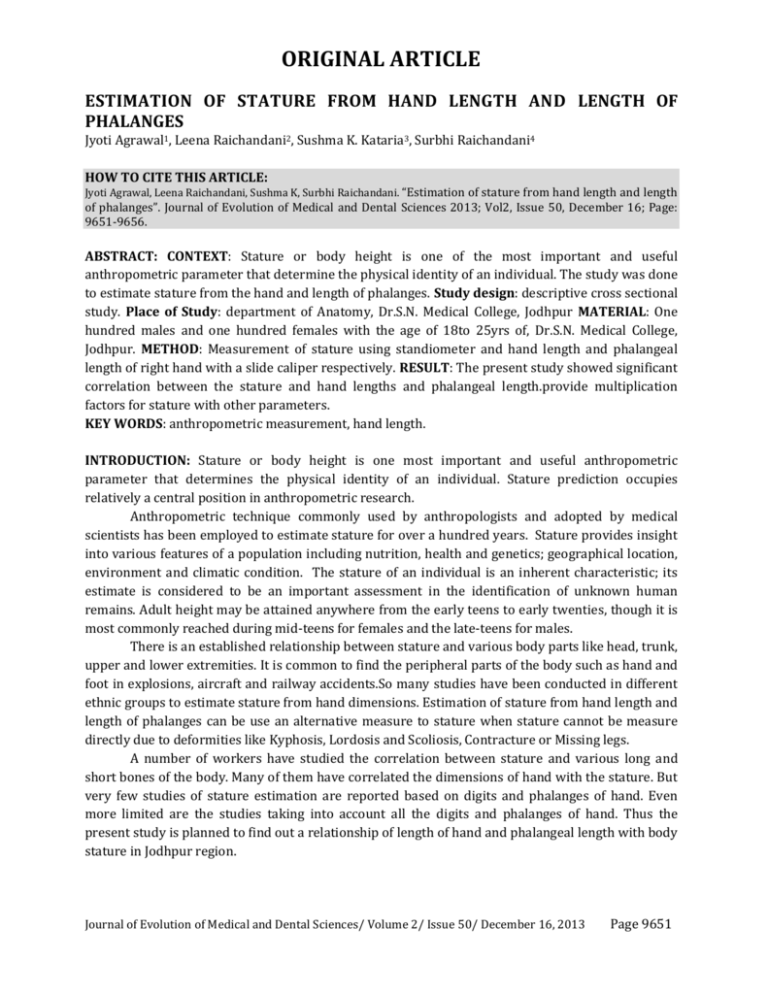
ORIGINAL ARTICLE ESTIMATION OF STATURE FROM HAND LENGTH AND LENGTH OF PHALANGES Jyoti Agrawal1, Leena Raichandani2, Sushma K. Kataria3, Surbhi Raichandani4 HOW TO CITE THIS ARTICLE: Jyoti Agrawal, Leena Raichandani, Sushma K, Surbhi Raichandani. “Estimation of stature from hand length and length of phalanges”. Journal of Evolution of Medical and Dental Sciences 2013; Vol2, Issue 50, December 16; Page: 9651-9656. ABSTRACT: CONTEXT: Stature or body height is one of the most important and useful anthropometric parameter that determine the physical identity of an individual. The study was done to estimate stature from the hand and length of phalanges. Study design: descriptive cross sectional study. Place of Study: department of Anatomy, Dr.S.N. Medical College, Jodhpur MATERIAL: One hundred males and one hundred females with the age of 18to 25yrs of, Dr.S.N. Medical College, Jodhpur. METHOD: Measurement of stature using standiometer and hand length and phalangeal length of right hand with a slide caliper respectively. RESULT: The present study showed significant correlation between the stature and hand lengths and phalangeal length.provide multiplication factors for stature with other parameters. KEY WORDS: anthropometric measurement, hand length. INTRODUCTION: Stature or body height is one most important and useful anthropometric parameter that determines the physical identity of an individual. Stature prediction occupies relatively a central position in anthropometric research. Anthropometric technique commonly used by anthropologists and adopted by medical scientists has been employed to estimate stature for over a hundred years. Stature provides insight into various features of a population including nutrition, health and genetics; geographical location, environment and climatic condition. The stature of an individual is an inherent characteristic; its estimate is considered to be an important assessment in the identification of unknown human remains. Adult height may be attained anywhere from the early teens to early twenties, though it is most commonly reached during mid-teens for females and the late-teens for males. There is an established relationship between stature and various body parts like head, trunk, upper and lower extremities. It is common to find the peripheral parts of the body such as hand and foot in explosions, aircraft and railway accidents.So many studies have been conducted in different ethnic groups to estimate stature from hand dimensions. Estimation of stature from hand length and length of phalanges can be use an alternative measure to stature when stature cannot be measure directly due to deformities like Kyphosis, Lordosis and Scoliosis, Contracture or Missing legs. A number of workers have studied the correlation between stature and various long and short bones of the body. Many of them have correlated the dimensions of hand with the stature. But very few studies of stature estimation are reported based on digits and phalanges of hand. Even more limited are the studies taking into account all the digits and phalanges of hand. Thus the present study is planned to find out a relationship of length of hand and phalangeal length with body stature in Jodhpur region. Journal of Evolution of Medical and Dental Sciences/ Volume 2/ Issue 50/ December 16, 2013 Page 9651 ORIGINAL ARTICLE REVIEW OF LITERATURE: Vitruvius (1883), the architect says in his work on architecture that the measurements of human body are distributed by nature as follows that is that 4 fingers make 1 palm and 4 palms make 1 foot, 6 palms make 1 cubit; 4 cubits make a man's height. And 4 cubits make one pace and 24 palms make a man; and these measures he used in his building and he says the length of a man’s outspread arms is equal to his height. S R Habib, N N Kamal (2009) examines the relationship between stature and hand and phalanges lengths among Egyptians. Stature, hand and phalanges lengths of 159 subjects, 82 males and 77 females (18–25 years) were measured. Statistical analysis indicated that bilateral variation was insignificant for all measurements. Sex differences were significant for all measurements. Linear and multiple regression equations for stature estimation were calculated. Correlation coefficients were found to be positive, but little finger measurements of male and distal phalanges of female fingers were not correlated with stature. Regression equations were checked for accuracy by comparing the estimated stature and actual stature. K. Yoganarasimha et al (2010) conducted study on 500 north and south Indian subjects in Manipal, India, to establish the stature of an individual using the middle finger length. Measurements were analysed statistically to establish the relationship between person's middle finger length and their stature. The study shows that the middle finger length bears a significant relation to stature and can be an important tool for stature estimation. MATERIAL AND METHODS: Present study will be conducted on the students and staff of North Indian origin of S.N. Medical College, Jodhpur, Rajasthan, who are willing to participate in the study comprising of both the genders 100 males and 100 females in the age group of 17-30 years belonging to various parts of North India Landmarks and techniques involved in taking anthropometric measurements: Stature: It is measured as the vertical distance from the vertex to the floor, where the vertex is the highest point on the head when the head is held in Frankfurt Horizontal (FH) plane. The subject was made to stand barefoot in an erect posture against the wall with both feet kept close together and hands hanging down on the sides. Hand Length: Distance from middle of the distal wrist crease to the distal end of most projecting point of hand. Proximal phalangeal length: Distance from middle of metacarpophalangeal crease to proximal phalangeal crease. Middle phalangeal length; Distance from middle of proximal phalangeal crease to middle of distal phalangeal crease. Distal phalangeal length: Distance from middle of distal phalangeal crease to the tip of the digit. For measurements on hand, all the digits including the thumb will be kept fully extended. Thumb of the both the hands are not included in the present study Journal of Evolution of Medical and Dental Sciences/ Volume 2/ Issue 50/ December 16, 2013 Page 9652 ORIGINAL ARTICLE Fig. 1: hand length measurement Fig. 2: phalangeal length measurement OBSERVATIONS: Findings were subjected to statistical computation and results have been presented in the following tables and illustrated through graphs. (Measurements) C.M. M a l e f e m a l e S t a t u r e 170.71 ± 8.572 161.6±7.627 H a n d l e n g t h 19.594 ± 1.115 19.673±1.1377 Index finger ppl 5.038 ± 1.071 4.9166±0.7939 Index finger mpl 3.523 ± 1.549 2.9033±0.463 Index finger dpl 2.859± 1.0956 2.571±1.923 Middle finger ppl 5.4330 ± 1.0956 5.285±1.1202 Middle finger mpl 3.7122± 0.6518 3.32±0.6530 Middle finger dpl 3.030±1.16886 2.383±0.5239 Ring finger ppl 4.9949±1.03 4.946±0.985 Ring finger mpl 3.762±2.6813 3.93±0.947 Ring finger dpl 2.693±0.587 2.306±0.7104 Little finger ppl 4.103±0.973 3.8933±0.89 Little finger mpl 2.75±0.744 2.463±0.552 Table 1: SOMATOMETERIC DATA OF RIGHT HAND (MEAN±SD) (DESCRIPTIVE STATISTICS) Table no. 1 representing data of right hand of both male and female student. Table no. 1 shows the mean height and standard deviation of male student is 170.71cms ±8.5121 and for female students mean height and standard deviation is 161.6 cm ±7.62. Right hand length of male students is 19.594±1.115 cm for and female students is 19.67±1.1377 cm and also shows mean length in cm and standard deviation of proximal , middle and distal phalanges of index, middle ring and little finger of both male and female students. Parameters Male right hand Female right hand Height 001 001 HL 0.608 0.658 IFPPL 0.452 0.588 Journal of Evolution of Medical and Dental Sciences/ Volume 2/ Issue 50/ December 16, 2013 Page 9653 ORIGINAL ARTICLE IFMPL IF DPL MFPPL MFMPL MFDPL RFPPL RFMPL RFDPL 0.539 0.478 0.594 0.478 0.613 0.379 0.396 0.356 0.426 0.398 0.475 0.512 0.526 0.466 0.329 0.386 Table 2: Somatometeric data of hand (RIGHT) Corelated with stature in both male and Female Table no. 2 Showing co-relation of other parameters with stature ranging from 0.329 to 0.683. MULTILICATION FACTOR (CO- RELATE WITH HEIGHT) PARAMETER MALE FEMALE HAND LENGTH 8.835 8.215 IFPPL 33.876 32.86 IFMPL 48.446 44.84 IFDPL 59.709 62.85 MFPPL 31.420 30.577 MFMPL 45.986 41.224 MFDPL .3399 58.81 RFPPL 34.176 32.66 RFMPL .3774 44.44 RFDPL 63.66 65.07 Table 3: Multiplication factors for other parameters correlated with stature Table no.3 showing multiplication factors for other parameters correlated with stature. DISCUSSION: From the present study we found some multiplication factor..Multiplying these multiplication factors with respective parameter we found some estimated statures which were correlate with the measured stature .All the measurements in this study were a positive as well as a statistically significant correlation with the stature. CONCLUSION: From the present study we found some multiplication factors which will be helpful for estimation of stature from right hand length and phalangeal length for both male and female of North India . That may be helpful for those who work in this area especially in the various medical disciplines, anthropologists. Journal of Evolution of Medical and Dental Sciences/ Volume 2/ Issue 50/ December 16, 2013 Page 9654 ORIGINAL ARTICLE REFERENCES: 1. Kewal Kishan. “Anthropometry in Forensic Medicine and Forensic Science- 'Forensic Anthropometry'”. The Internet Journal of Forensic Science 2007;2(1). 2. Singh S., Hussain M., Rizvi S.J. “Estimation of stature from Foot measurements in adults”. International Journal of Medical Toxicology and Legal Medicine 2010 Oct-Dec;13(2):46-49. 3. Alicia Canda. “Stature estimation from body segment lengths in young adults- Application to people with Physical Disabilities”. Journal of Physiological Anthropology 2009;28(2):71-82. 4. Prateek Rastogi. “Methods of stature estimation: A Review”. Journal of Forensic Medicine and Toxicology 2009 Jan-June;26(1):10-13. 5. Saxena S.K. “A study of correlations and estimation of stature from hand length, hand breadth and sole length”. AnthropolAnz 19 Dec;42(4):271-276. 6. Abdel-Malek A.K., Ahmed A.M., el-Sharkawi S.A., el-Hamid N.A.“Prediction of stature from hand measurements”. Forensic Science international 1990 July;46(3):181-187. 7. Sultan G. Sanli, Emine D., Kizilkanat, NeslihanBoyan, Esin T. Ozsahin,M. Gulhal Bozkir, Roger Soames, HamzaErol, OzkanOguz. “Stature estimation based on hand length and foot length”. Clinical Anatomy 2005 Nov;18(8):589–596. 8. Özaslan A, Koç S, Özaslan I, Tugcu H. ”Estimation of stature from Upper Extremity”. Military Medicine 2006 Apr;171(4):288-291. 9. SyedaZamilaHasanLaila, Roxana Ferdousi, A.B.M. Nurunnobi, A.T.M. ShafiqulIslam,SyedaZamila Hosen Holy, Farzana Yesmin. “Anthropometric Measurements of the hand length and their correlation with the Stature of Bengali adult Muslim females.” Bangladesh Journal of Anatomy 2009 Jan;7(1):10-13. 10. IsuraniIlayperuma, Ganananda Nanayakkara, Nadeeka Palahepitiya. “Prediction of personal stature based on the hand length”. Galle Medical Journal 2009 Sep;14(1):15-18. 11. Rastogi P, Nagesh K.R., Yoganarasimha K. “Estimation of stature from hand dimensions of north and south Indians.” Legal Medicine (Tokyo) 2008 Jul;10(4):185-189. 12. Kumar Amit, Srivastava A. K., Verma A.K. “Estimation of Stature by Percutaneous Measurements of Distal Half of Upper Limb (Forearm & Hand)”. Journal of Indian Academy of Forensic Medicine 2010;32(4). 13. Kumar Sushil, Srivastava, A.K., Sahai, M.K.B. “Estimation of stature by anthropometric examination of forearm and hand”. Journal of Indian Academy of Forensic Medicine 2010 Mar;32(1). 14. Chikhalkar B.G., Mangaonkar A.A., Nanandkar S.D., Peddawad R.G. “Estimation of Stature from Measurements of Long Bones, Hand and Foot Dimensions”. Journal of Indian Academy of Forensic Medicine 2010 Mar;32(4). 15. V. Waghmare, R. Gaikwad & N. G. Herekar. “Estimation Of The Stature From The Anthropometric Measurement of Hand Length”. The Internet Journal of Biological Anthropology 2011;4(2). 16. Tyagi A.K., Kohli K, Verma S.K., Aggarwal B.B.L. “Correlation between stature and fingers length.” International Journal of Medical Toxicology and Legal Medicine 1999;1(2):20-22. 17. B. Danborno, S. S. Adebisi, A. B. Adelaiye & S. A. Ojo. “Estimation of Height and weight from the Lengths of Second and Fourth Digits in Nigerians.” The Internet Journal of Forensic Science 2009;3(2). Journal of Evolution of Medical and Dental Sciences/ Volume 2/ Issue 50/ December 16, 2013 Page 9655 ORIGINAL ARTICLE 18. Prateek Rastogi, Tanuj Kanchan, Ritesh G. Menezes, K. Yoganarasimha“ Middle finger length - a predictor of stature in the Indian population.” Medicine Science Law 2009 Apr;49(2):123-126. 19. Annie J. Varghese, Balaraj B.M., Pramod Kumar G.N. “A study of estimation of stature from length of fingers in Mysore” Indian Journal of Forensic Medicine Toxicology 2010 July-Dec;4(2) 20. Shivakumar A.H., Vijaynath V., Raju G.M. “Estimation of co-relation between middle finger length and stature of females in South Indian population.” Indian Journal of Forensic Medicine Toxicology2011 Jan-June;5(1). AUTHORS: 1. Jyoti Agrawal 2. Leena Raichandani 3. Sushma K. Kataria 4. Surbhi Raichandani PARTICULARS OF CONTRIBUTORS: 1. M.Sc. Student, Medical, Department of Anatomy, S..N. Medical College, Jodhpur, Rajasthan. 2. Professor, Department of Anatomy, S..N. Medical College, Jodhpur, Rajasthan. 3. Professor and H.O.D, Department of Anatomy, S..N. Medical College, Jodhpur, Rajasthan. 4. MBBS Student, Department of Anatomy, S..N. Medical College, Jodhpur, Rajasthan. NAME ADRRESS EMAIL ID OF THE CORRESPONDING AUTHOR: Dr. Jyoti Agrawal, W/O, Dr. I.K. Bansal, 1062, Sector-3, HUDA Colony, Faridabad, Haryana. Email – drjib@yahoo.com Date of Submission: 13/11/2013. Date of Peer Review: 14/11/2013. Date of Acceptance: 20/11/2013. Date of Publishing: 10/12/2013 Journal of Evolution of Medical and Dental Sciences/ Volume 2/ Issue 50/ December 16, 2013 Page 9656

